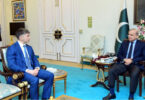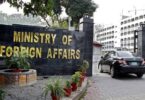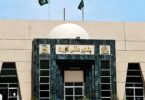F.P. Report
ISLAMABAD: Defence Minister Khawaja Asif has said that the much talked-about military operation, Operation Azm-e-Istehkam, is not the Pakistan Army’s, but the government’s requirement
Responding to a question during an interview with the BBC, the minister has said that even if the operation is the army’s initiative, it is the government’s responsibility to carry it out.
He has told the BBC that following several military operations in the past, the military and governments in Pakistan were not expecting that militancy would raise its head again.
“However, some developments took place during the last 10 years which led to a rise in incidents of terrorism. These include the withdrawal of the US and NATO forces from Afghanistan and the PTI government during which the militants were resettled in Pakistan,” the minister has opined.
He has said that the government was hopeful that the new Taliban government in Afghanistan would cooperate with it in fighting the Tehreek-i-Taliban Pakistan (TTP) militants, but the Afghan government let it down by not taking any action against these terrorists. “The reason is that those sitting in Kabul are hands in gloves with the TTP,” he has said.
Confirming that Pakistan has recently targeted TTP safe havens inside Afghanistan, he has also made it clear that the country would continue to target the terrorists based in Afghanistan.
Responding to a question about whether the government of Pakistan informs the Taliban prior to the attack as per the rules related to international borders, the minister has said, “No this is not the case since it eliminates the element of surprise. We cannot tell them to get ready. We are coming.”
He, however, has said that the government will remain engaged in consultations with political parties as well as tribal elders on the operation, which has been launched to combat terrorism and restore peace in restive areas.
Admitting that the people living in the country’s tribal belt had reservations over any operation in their areas, Asif has said that one of the reasons is that their areas are still underdeveloped.
“Another reason is that the promises made to the people of tribal areas at the time of merger of erstwhile FATA into Khyber Pakhtunkhwa (KP) have not been fulfilled,” he has said.
Responding to another question about whether any military operation could be successful without the support of locals, he has said, “I don’t think that a majority of people living in the tribal belt are opposed to an operation.”
Dispelling the impression that local people, politicians and other stakeholders were not taken on board prior to the start of the operation, the minister has said it would be wrong to say that since the matter was first discussed at the apex committee meeting, which was attended by the chief ministers of four provinces, senior bureaucrats and the army’s high command. “Then it was taken up for discussion at the federal cabinet meeting at which all stakeholders were present,” Asif has said, adding, “It is pertinent to mention here that the KP chief minister raised no objection to the operation when it was first discussed at the apex committee meeting.”
He has said there is a possibility that if opponents of the operation are briefed about the operation in detail, they might change their viewpoints.
Similarly, the minister has also dispelled the impression that the political parties which have a vote bank in KP, particularly in the province’s tribal areas, were not taken into confidence before the start of the operation.
He has said there is a need to combat militancy with new vigour and passion.
Asif has further said that it is not due to pressure from China that the government has launched the operation. “It is true that China wants to again start investing their money in Pakistan and also want safe and secure environment for its engineers in Pakistan, but they did not pressurize the government for the operation.”
Responding to a question, the minister has said that the government is willing to talk to Baloch separatists in case they are interested in joining the national mainstream.
Courtesy: 24News







